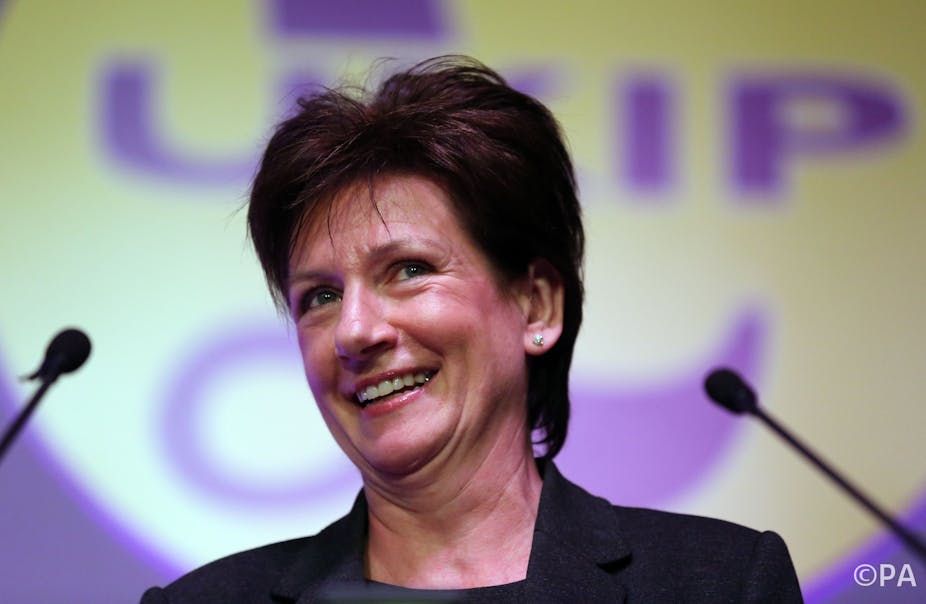After nine years of “Faragism”, UKIP has a new leader in the form of Diane James, the party’s MEP for South East England.
She takes over from Nigel Farage, who said shortly after the EU referendum that he wants to “get his life back”. Taking the helm of the party at its annual conference in Bournemouth, James pledged to focus on policy and make sure her party is “battle ready” for the next election, “whenever that may be”. She warned prime minister Theresa May that hers is the “opposition party in waiting”.
Emphasising UKIP’s role in holding the government to account over Brexit negotiations, she pledged to oppose associate membership or “Brexit-lite” and “unrestricted, uncontrolled” immigration into the EU. Entry should be allowed based on skill requirements, she added. “That’s what independence means” she warned “Remainiacs”.
James emerged as the favourite for the job after her main rival Steven Woolfe was disqualified. He had been seen as the main contended but missed the deadline to file his documents for the leadership race by 17 minutes.
Farage’s departure marked the end of an era for the party, which has achieved its initial objective to get Britain out of the EU. It now needs to decide if it has a future in British politics and what shape that future will take.
What can we expect from the new leader?
James quickly emerged as the bookmakers’ favourites after Woolfe’s exclusion. She had the support of the UKIP-led Leave. EU campaign and of the party’s main donor Arron Banks, who even suggested that the party has no future unless James wins.
However, James has often been perceived as a reluctant candidate. She refused to attend the official leadership hustings and didn’t present a programme for her leadership. There have even been suggestions that she would essentially act as interim leader, keeping the seat warm for either Farage of Woolfe, either of whom could make a comeback, depending on the Brexit deal.
This leadership campaign has perfectly illustrated the obstacles UKIP will face over the next few months. Most notable is the lack of charismatic figure to become “Farage 2.0”.
An opinion poll conducted in mid-August found out that more than 80% of the general audience has never heard of any of the leadership candidates, while UKIP voters also showed poor knowledge of their potential leaders during the campaign (only 30% of them recognised Diane James).

A second problem is the lack of long-term objectives. UKIP was founded as a single-issue Eurosceptic party in the 1990s. Even though the party successfully broadened its horizons in recent years, many believe it peaked at Brexit.
Steve Stanbury, an ex-director of the party, has just announced that he has rejoined the Conservatives, while some insiders said the party has started losing support. The new Conservative government, under the leadership of Theresa May, appears to be offering much of what drew voters to UKIP in the first place.
With Brexit on the horizon, UKIP cannot survive unless it broadens its platform beyond Europe, even though Diane James based her leadership campaign on this topic.
While UKIP was successful in putting the Conservative Party under pressure over the past few years, it now has little room for manoeuvre. May is committed to delivering a good deal for the UK outside the EU and has already ruled out UKIP’s immigration policy, an Australian points-based system. The party is now facing an unprecedented identity crisis that must be addressed if it wants to maintain momentum.
Infighting
Finally, the party is becoming increasingly divided. While tensions between prominent UKIP members such as Suzanne Evans, Douglas Carswell and Nigel Farage have been simmering for some time, the leadership campaign has further illustrated that the party is far from united.
This is again illustrated by yet another defection from UKIP to the Conservatives, as Alex Phillips (a former aide of Nigel Farage) said that the party is in a “catastrophic mess”. Of course, one might argue that party divisions are rather common in British party politics nowadays, but unless UKIP is able to establish itself as a capable, cohesive, well-organised political force opposing the government’s policies, its membership base could be tempted to leave the party.
Despite these obstacles, it is far too early to tell whether UKIP’s fox is shot. Sure, James is now facing a mountain of obstacles, but one should not forget that more than 3.8m people voted for UKIP only a year ago.
The chances of UKIP surviving post-Brexit largely depend on the nature of the new relationship negotiated between the UK and the EU. Should the deal be judged unsatisfactory – especially in terms of restrictions on EU immigration – UKIP could capitalise on public discontent. If not, it needs to significantly rebrand – or face demise.

